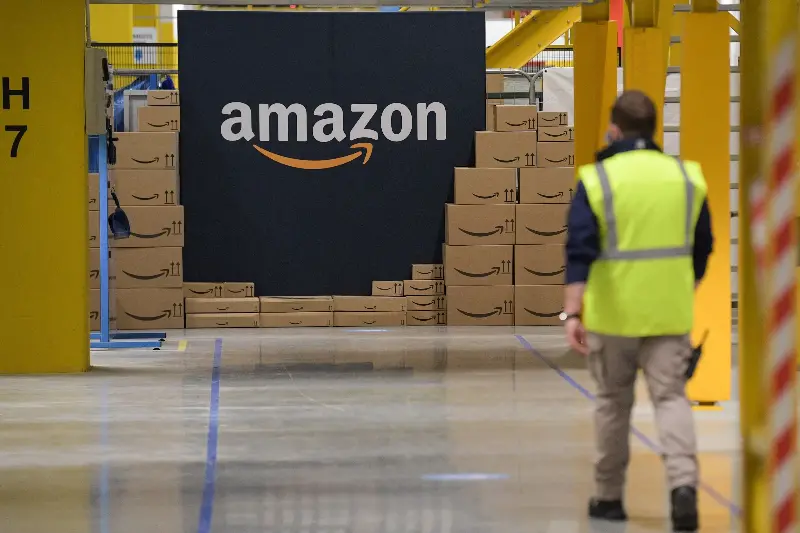
Environmental activists have for years pressed Amazon to reduce the plastic used in shipping more than 20 million packages daily. Amazon's latest sustainability report shows that the company is apparently responding.
Amazon reported that it cut its use of plastic packaging in shipping by more than a quarter in 2024. Single-use plastics dropped from 65 percent of shipments in 2023 to 37 percent in 2024, the report showed, and the company estimated that it avoided using 134 million plastic bags last year.
"Since 2019 our packaging engineers and materials scientists have been working on innovative paper-based packaging solutions like our recyclable paper padded mailer," Pat Lindner, Amazon's VP of mechatronics and sustainable packaging, told Newsweek via email. "After thorough testing to ensure new solutions are protecting products, we're able to move quickly."
Linder said Amazon removed plastic air pillows from delivery packaging and that new automation, such as retrofitting machines that previously made plastic bags, allowed for wider use of paper bags in North America.
"Our commitment to progress has always been driven by two key factors: sustainability and customer experience," Lindner said.
Amazon had another source of motivation, however, and that came from sustainability-minded shareholders.
"We've been working for five years now filing proposals with the company and having sporadic engagements with them," Conrad MacKerron, senior vice president of the nonprofit group As You Sow, told Newsweek. The group promotes social and environmental responsibility by engaging with companies as shareholders.
In 2020, MacKerron said, As You Sow started campaigning to get Amazon to reduce its plastic packaging through shareholder proposals that called for a commitment to reduce plastics and to increase the company's transparency on packaging.
The group said those proposals achieved shareholder support as high as 49 percent.
MacKerron said Amazon is "not very easy to talk to," and the company resisted the group's main request, to set a public goal for plastic reduction by a certain date.
However, beginning in 2023, Amazon first disclosed the volume of plastic packaging it used in shipping, he said, and has reported significant reductions in plastic shipping materials over the past two years.
"To have those bags pretty much eliminated is great progress, we think, and shows some responsiveness by the company to this concern that so much plastic is ending up in the ocean," MacKerron said.
Plastic waste has grown into a global environmental and public health crisis with plastics clogging waterways, killing marine wildlife and causing growing concern about the effects of human exposure to microplastics and toxic components of some plastics.
Next month, years of effort to galvanize international action on plastic waste will reach a critical point as negotiators meet in Geneva for talks on a global plastics treaty.
Later today Newsweek will host a live remote event with a panel of experts offering insights into the treaty negotiations and the latest efforts to reduce plastic waste. Register here for "Turning the Tide on Plastic Waste," and join us at 2 p.m. ET from your laptop or mobile device.
MacKerron said As You Sow is continuing its engagement with Amazon to encourage the company to disclose more about plastics used in parts of its operations beyond shipping.
"The shareholder proposal that we filed this year was more about the packaging being used for their other areas where they haven't disclosed, such as food and beverage and the Whole Foods Market," he said.
Amazon is the parent company of Whole Foods Market which has more than 500 stores around the country. MacKerron said many of the store's products come in plastic packaging that is difficult to recycle. He said some competitors, including Walmart and Target, have disclosed how much plastic they use and have set goals to reduce plastic, but Amazon has not.
"They have still not disclosed how much that represents or whether they are doing anything significant to reduce the use of the actual product packaging itself," he said.
An Amazon representative told Newsweek via email that Whole Foods Market is working toward making 100 percent of its own packaging reusable, recyclable or compostable. Whole Foods was also the first U.S. grocer to ban disposable plastic bags at checkout and to get rid of plastic straws at its cafes and coffee shops, the company said.
MacKerron said he is "encouraged by the progress" Amazon is making to reduce plastic use but still wants the company to commit to a target and timetable.
"We would still like to see the company set a goal," he said. "We think that pressure is good, actually and constructive and helps keep them focused."
